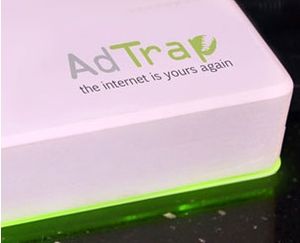Secure your place at the Digiday Publishing Summit in Vail, March 23-25

Advertising pays for the majority of the free content and services available on the Web, but that doesn’t stop internet “purists” from doing their best to eradicate it.
AdTrap is the latest attempt to do so. The product’s creator, BluePoint Security founder Chad Russell, is seeking funding on Kickstarter to take it into full production. As of writing the project had raised $65,000 from 578 backers, and looks set to reach Russell’s goal of $150,000 by December 8th.
“Tired of advertisements interrupting your movies, music and browsing experience? At one time, the internet was free and uncluttered, we remember and we want it back,” the Kisckstarter page proclaims. “Aside from driving you crazy, internet advertisers are tracking your habits, behaviors and uniquely identifiable information. AdTrap quickly and easily puts a stop to it.”
There are plenty of ad blocking and privacy-related programs and browser plug-ins already available, of course, but AdTrap is hardware based. That means a small, Linux-based machine sits in between users’ modems and routers, and filters out ad tags and code. That also means it will do so for any devices connected to that router, such as smartphones, tablets, and connected TV devices, too.
But advertisers needn’t be too concerned just yet. The appetite for ad-free browsing exists amongst a tiny percentage of Internet users, as the adoption rates of plugins like AdBlock and Adblock Plus demonstrate. That said, the percentage of users wishing to avoid ads is growing, for both aesthetic and privacy-related reasons. As a result, products such as AdTrap should be on their radar, at least.
AdTrap promises to block all display, audio and video ads, but won’t be able to intercept the content-based formats found on sites like BuzzFeed or Gawker, or native ads such as those on Facebook and Twitter. The box also allows users to program “whitelists,” so they can see ads from specific sites only, if they want.
More in Marketing

Yahoo pauses IAB membership amid a series of quiet cost-saving measures
Yahoo pulls IAB board memberships, following job cuts as PE-owner reportedly reconsiders ad tech investments.

Target looks to e-commerce, advertising investments to help grow the business
Technology is one of the most important areas in which Target will invest with the hopes of returning to profit growth.

‘The conversation has shifted’: The CFO moved upstream. Now agencies have to as well
One interesting side effect of marketing coming under greater scrutiny in the boardroom: CFOs are working more closely with agencies than ever before.





